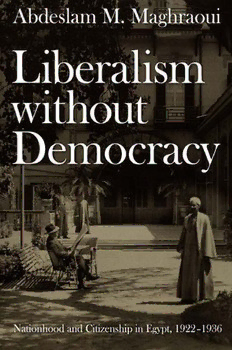
Liberalism without Democracy: Nationhood and Citizenship in Egypt, 1922–1936 PDF
Preview Liberalism without Democracy: Nationhood and Citizenship in Egypt, 1922–1936
Liberalism without Democracy politics, history, and culture A series from the International Institute at the University of Michigan series editors: George Steinmetz and Julia Adams series editorial advisory board: Fernando Coronil Nancy Rose Hunt Julie Skurski Mamadou Diouf Andreas Kalyvas Margaret Somers Michael Dutton Webb Keane Ann Laura Stoler Geo√ Eley David Laitin Katherine Verdery Fatma Müge Göcek Lydia Liu Elizabeth Wingrove Sponsored by the International Institute at the University of Michigan and published by Duke University Press, this series is centered around cultural and historical studies of power, politics, and the state—a field that cuts across the disciplines of history, sociology, anthropology, political science, and cultural studies. The focus on the relationship between state and culture refers both to a methodological approach— the study of politics and the state using culturalist methods—and to a substantive one that treats signifying practices as an essential dimen- sion of politics. The dialectic of politics, culture, and history figures prominently in all the books selected for the series. Liberalism without Democracy Nationhood and Citizenship in Egypt, 1922–1936 Abdeslam M. Maghraoui Duke University Press Durham & London 2006 ∫ 2006 Duke University Press All rights reserved Printed in the United States of America on acid-free paper Designed by Jennifer Hill Typeset in Quadraat by Keystone Typesetting, Inc. Library of Congress Cataloging-in-Publication Data appear on the last printed page of this book. Duke University Press gratefully acknowledges the support of Hicham Ben Abdellah, founder of the Transregional Institute for the Study of North Africa, the Middle East, and Central Asia at Princeton University, who provided funds toward the production of this book. To my twin daughters Sarah and Lena Who taught me the meaning of signs in establishing authority, ownership, and di√erence ix preface xix acknowledgments 1 introduction 14 one Colonialism as a Literary and Historical Phenomenon 37 two The Colonial Encounter in Egypt 64 three Defining the Boundaries of the Political Community 87 four The Cultural Preconditions of Citizenship 118 five Egypt’s Liberal Experiment in Comparative Perspective 141 conclusion 149 notes 171 selected bibliography 181 index preface Abdelfattah Kilito, a Moroccan fiction writer and classical Arabic litera- ture specialist, tells the story of a Bedouin who strayed at night and got lost in the desert.∞ To find his way, the Bedouin began to imitate a dog barking, hoping to induce scavenger dogs around nearby camps to bark back so that he could follow their echoes to human habitation. The night- time itinerant is caught in a dire situation: he must mimic a dog to become human again, but mimicry can have a steep price. Imagine if you will, ponders Kilito, that our mustanbih—‘‘he who provokes the barking of dogs by imitating them’’—returns to civilization and begins to bark in earnest because he has lost his human language. How would his tribe react if he barked in response to their questions? What should his tribe do if he actually adopted canine habits and started chasing cats and gnawing bones? What if his kinfolk accept him, as strange as he might be, but then he begins yapping and groaning during community meetings where serious matters are discussed, or during sacred ceremonies where dogs’ barking is most improper? Kilito presented this parable at a conference on bilingualism in Morocco in 1981 as an allegory for the alleged alienation of North African intellectuals who write in French. The central question at hand, then, was whether writ- ing in the language of the colonial other disfigures one’s identity and the perception of one’s own culture and society. Contrary to what one might expect from a writer who draws insight for his tale from al-Jahidh, an almighty literary figure in ninth-century Baghdad, Kilito does not advocate cultural or linguistic uniformity in the name of an authentic language or literary tradition. He is thoroughly bilingual and bicultural and embraces his dual position completely. Yet Kilito takes us into a playful and engrossing
